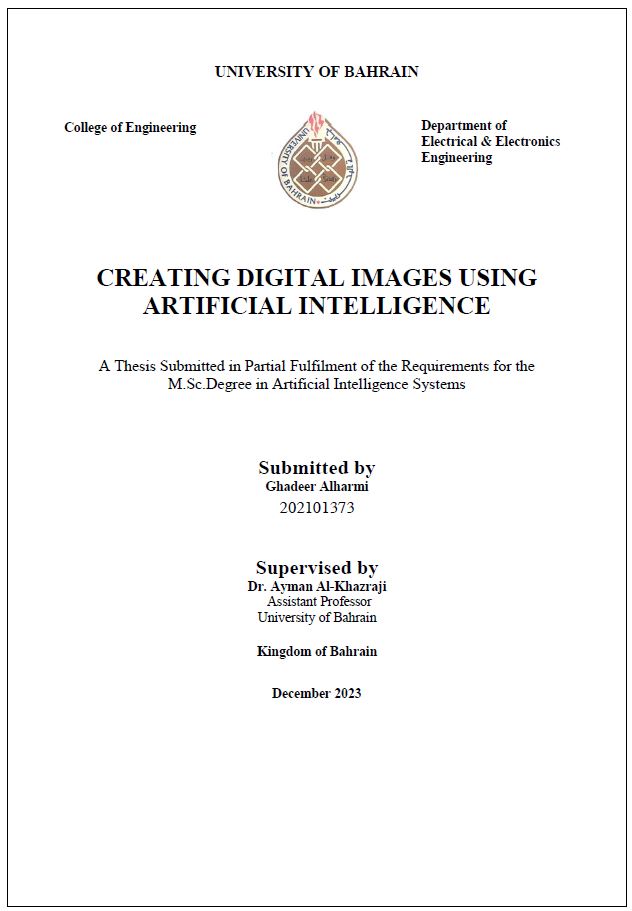The Significance of Artificial Intelligence in the Human Resources Decision-Making Process
وكيل مرتبط
Bin Khalifa, Ali, مشرف الرسالة العلمية
تاريخ النشر
2022
اللغة
الأنجليزية
مدى
[4], 10, 148 pages
الموضوع
مكان المؤسسة
Sakhir, Bahrain
نوع الرسالة الجامعية
Master
الجهه المانحه
University of Bahrain
الوصف
Abstract
The goal of this study is to assess how the use of AI in HR at Bahrain's Ministry of Works, Municipality Affairs, and Urban Planning affects policy decisions. In this study, we focus on descriptive-predictive artificial intelligence algorithms.
Methodology/Design Sixty workers from the Bahraini Ministry of Works, Municipal Affairs, and Urban Planning filled out an online survey for the study after the link to the survey was circulated amongst the ministry's staff. Using a five-point Likert scale, respondents were prompted to indicate the extent to which they agreed or disagreed with each item in the survey. IBM SPSS was used to run statistical tests on the acquired data to see if they supported the hypotheses.
Conclusions The findings demonstrated that algorithm-based decision-making could complement human sense-making by empowering human resources professionals to make decisions that are highly rational, very fact-driven, and exceptionally dependable. In example, prescriptive algorithms expand the amount of data available, typically without imposing any particular interpretation patterns. The HR decision-making processes in the ministry are positively and strongly connected with descriptive, predictive, and prescriptive algorithms. Human resources decisions in Bahrain's Ministry of Works, Municipality Affairs, and Urban Planning are also found to be significantly impacted by the implementation of AI algorithms.
Artificial intelligence algorithms were found to have a positive and significant impact on the
HR decision-making process in Bahrain's Ministry of Works, Municipality Affairs, and Urban Planning through their descriptive, predictive, and prescriptive capabilities.
AI, Keywords, and Other AI-Related Terms There are three types of algorithms :
descriptive, predictive, and prescriptive Human Resource Management
The goal of this study is to assess how the use of AI in HR at Bahrain's Ministry of Works, Municipality Affairs, and Urban Planning affects policy decisions. In this study, we focus on descriptive-predictive artificial intelligence algorithms.
Methodology/Design Sixty workers from the Bahraini Ministry of Works, Municipal Affairs, and Urban Planning filled out an online survey for the study after the link to the survey was circulated amongst the ministry's staff. Using a five-point Likert scale, respondents were prompted to indicate the extent to which they agreed or disagreed with each item in the survey. IBM SPSS was used to run statistical tests on the acquired data to see if they supported the hypotheses.
Conclusions The findings demonstrated that algorithm-based decision-making could complement human sense-making by empowering human resources professionals to make decisions that are highly rational, very fact-driven, and exceptionally dependable. In example, prescriptive algorithms expand the amount of data available, typically without imposing any particular interpretation patterns. The HR decision-making processes in the ministry are positively and strongly connected with descriptive, predictive, and prescriptive algorithms. Human resources decisions in Bahrain's Ministry of Works, Municipality Affairs, and Urban Planning are also found to be significantly impacted by the implementation of AI algorithms.
Artificial intelligence algorithms were found to have a positive and significant impact on the
HR decision-making process in Bahrain's Ministry of Works, Municipality Affairs, and Urban Planning through their descriptive, predictive, and prescriptive capabilities.
AI, Keywords, and Other AI-Related Terms There are three types of algorithms :
descriptive, predictive, and prescriptive Human Resource Management
ملاحظة
Title on Cover :
أهمية الذكاء الإصطناعي في عملية صنع القرار في الموارد البشرية
أهمية الذكاء الإصطناعي في عملية صنع القرار في الموارد البشرية
المجموعة
المعرف
https://digitalrepository.uob.edu.bh/id/24caa49b-1fc5-461e-b33a-944322b5053c
https://digitalrepository.uob.edu.bh/id/24caa49b-1fc5-461e-b33a-944322b5053c
مواد أخرى لنفس الموضوع
